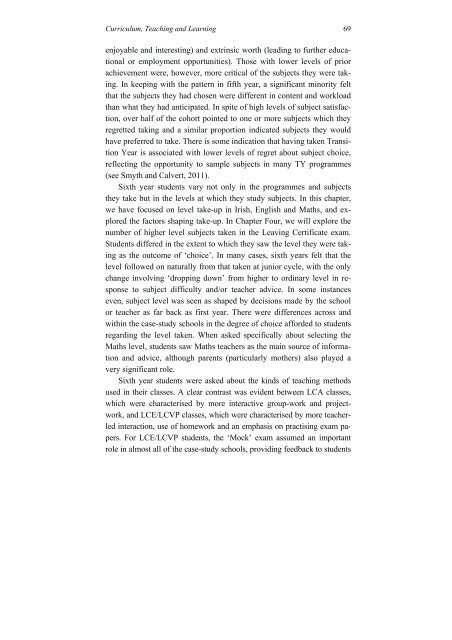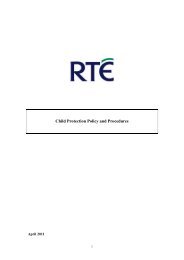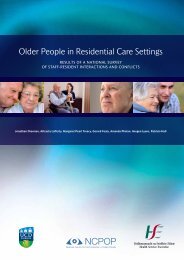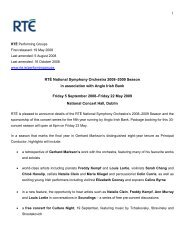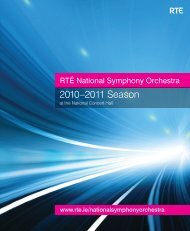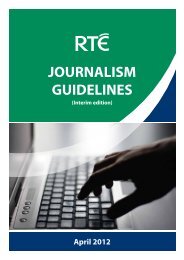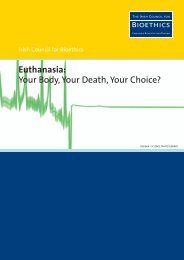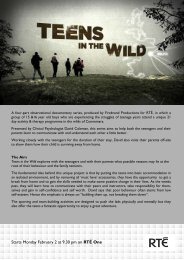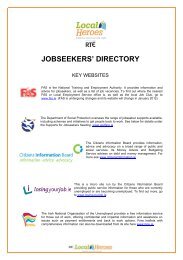From Leaving CertiFiCate to Leaving SChooL a Longitudinal Study ...
From Leaving CertiFiCate to Leaving SChooL a Longitudinal Study ...
From Leaving CertiFiCate to Leaving SChooL a Longitudinal Study ...
You also want an ePaper? Increase the reach of your titles
YUMPU automatically turns print PDFs into web optimized ePapers that Google loves.
Curriculum, Teaching and Learning 69<br />
enjoyable and interesting) and extrinsic worth (leading <strong>to</strong> further educational<br />
or employment opportunities). Those with lower levels of prior<br />
achievement were, however, more critical of the subjects they were taking.<br />
In keeping with the pattern in fifth year, a significant minority felt<br />
that the subjects they had chosen were different in content and workload<br />
than what they had anticipated. In spite of high levels of subject satisfaction,<br />
over half of the cohort pointed <strong>to</strong> one or more subjects which they<br />
regretted taking and a similar proportion indicated subjects they would<br />
have preferred <strong>to</strong> take. There is some indication that having taken Transition<br />
Year is associated with lower levels of regret about subject choice,<br />
reflecting the opportunity <strong>to</strong> sample subjects in many TY programmes<br />
(see Smyth and Calvert, 2011).<br />
Sixth year students vary not only in the programmes and subjects<br />
they take but in the levels at which they study subjects. In this chapter,<br />
we have focused on level take-up in Irish, English and Maths, and explored<br />
the fac<strong>to</strong>rs shaping take-up. In Chapter Four, we will explore the<br />
number of higher level subjects taken in the <strong>Leaving</strong> Certificate exam.<br />
Students differed in the extent <strong>to</strong> which they saw the level they were taking<br />
as the outcome of ‘choice’. In many cases, sixth years felt that the<br />
level followed on naturally from that taken at junior cycle, with the only<br />
change involving ‘dropping down’ from higher <strong>to</strong> ordinary level in response<br />
<strong>to</strong> subject difficulty and/or teacher advice. In some instances<br />
even, subject level was seen as shaped by decisions made by the school<br />
or teacher as far back as first year. There were differences across and<br />
within the case-study schools in the degree of choice afforded <strong>to</strong> students<br />
regarding the level taken. When asked specifically about selecting the<br />
Maths level, students saw Maths teachers as the main source of information<br />
and advice, although parents (particularly mothers) also played a<br />
very significant role.<br />
Sixth year students were asked about the kinds of teaching methods<br />
used in their classes. A clear contrast was evident between LCA classes,<br />
which were characterised by more interactive group-work and projectwork,<br />
and LCE/LCVP classes, which were characterised by more teacherled<br />
interaction, use of homework and an emphasis on practising exam papers.<br />
For LCE/LCVP students, the ‘Mock’ exam assumed an important<br />
role in almost all of the case-study schools, providing feedback <strong>to</strong> students


